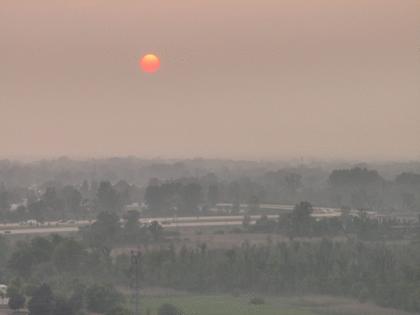Michigan GOP reps demand Canada contain wildfires whose smoke is polluting summer vacations
Published in News & Features
WASHINGTON — The seven Michigan Republicans in the state's congressional delegation issued a joint statement Wednesday blaming Canada for wildfires whose smoke caused air-quality issues across the state in recent weeks, asking the Canadian government to "take immediate and decisive action to contain these fires and prevent future wildfires."
"Instead of enjoying family vacations at Michigan’s beautiful lakes and campgrounds, for the third summer in a row, Michiganders are forced to breathe hazardous air as a result of Canada’s failure to prevent and control wildfires. This recurring crisis is putting public health at risk — especially for seniors, pregnant women, children, and those with respiratory conditions," the lawmakers said.
"This cannot continue as an annual threat to our communities.”
The statement follows a letter to the Canadian prime minister sent by U.S. Rep. John James, R-Shelby Township, on the same issue last week, "to express the outrage of our constituents" about the third summer of smoke and pollution from Canadian wildfires.
James, who is running for governor, noted that 69 million Midwest residents were under air quality alerts ― a figure larger than the population of Canada ― and said the situation is "actively damaging the U.S.-Canada relationship."
This week, forecasters had extended a statewide air quality advisory, anticipating that smoke from the wildfires would linger over the state and cause unhealthy levels of particle pollution. At times, air quality could be bad enough that it would be unhealthy for everyone and not just sensitive groups, according to Michigan Department of Environment, Great Lakes and Energy meteorologists.
The Canadian Embassy didn't immediately comment on the Michigan lawmakers' remarks Wednesday, but a spokeswoman told The New York Times last month that, “Canada takes the prevention, response and mitigation of wildfires very seriously.”
Wab Kinew, the premier of the western Canadian province of Manitoba, where wildfires killed two in May, blasted a similar letter sent by six members of Congress from Minnesota and Wisconsin last month, claiming that the lawmakers were “trying to trivialize and make hay out of a wildfire season where we’ve lost lives in our province.”
Climate change is fueling the Canadian wildfires, said Jonathan Overpeck, dean of the School for Environment and Sustainability at the University of Michigan. Burning fossil fuels and loading greenhouse gases into the atmosphere is warming the planet, which allows the atmosphere to hold more moisture. That causes more extreme droughts and more extreme rainstorms, Overpeck said.
There is a drought in the areas where Canadian wildfires are spreading, according to the Canadian Drought Monitor. That dry vegetation is ready to burn.
“You have an atmosphere that’s just going to dry out the soil and vegetation faster,” Overpeck said. “It’s giving rise to a lot more wildfire.”
Although it’s harder to prevent fires in a warming world, it’s reasonable for U.S. lawmakers to ask Canada to do more to manage them, Overpeck said. But as the Trump administration aims to end the federal government’s ability to regulate greenhouse gas emissions, Overpeck said it is also reasonable for Canadians to complain about the U.S. dismantling its climate policies.
“They’re probably not happy the U.S. is pulling back on our fighting of climate change, which they know in Canada pretty clearly is the real problem. ... They are fighting climate change much more fiercely than we now are," Overpeck said.
“When we tell Canada ‘do more to fight your fires,’ it would be reasonable for them to say ‘do more to fight climate change, because climate change is the big problem,” Overpeck added.
_____
©2025 www.detroitnews.com. Visit at detroitnews.com. Distributed by Tribune Content Agency, LLC.







Comments